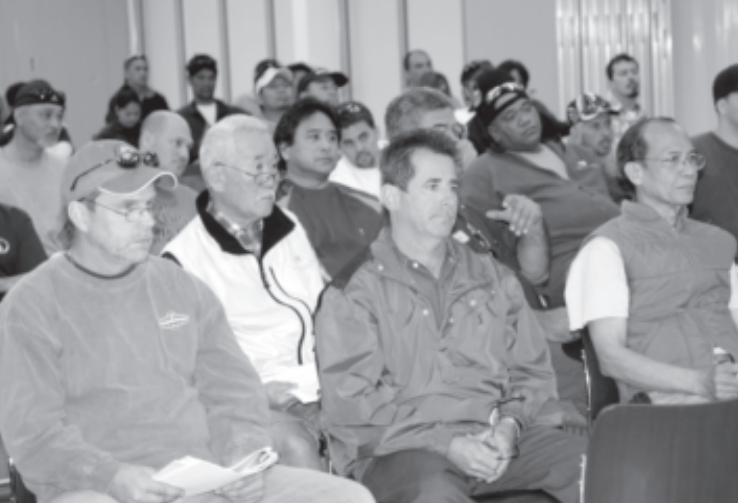
Young Brothers Ltd. Honolulu port members listen carefully to a report on their tentative agreement before voting overwhelming to accept the settlement on February 27, 2009.

Young Brothers Ltd. union negotiating committee members are: (sitting, l-r) Michael Victorino Jr. (Kahului), Jonathan Kaaihue (Honolulu), Walter Rawlins (Molokai), Kevin Pupuhi (Honolulu), Willa Tancayo (Honolulu); (standing, l-r) International Vice President - Hawaii Wesley Furtado, Michael Park (Kawaihae), Unit 4201 (Longshore) Chairperson Nate Lum, Wayne Alonzo (Lihue), Rankin Gossert (Hilo) and Denis Mello (Honolulu).
HONOLULU—Members at shipping company Young Brothers, Ltd. have overwhelmingly ratified a new six-year agreement, which covers over 200 workers statewide. Members at the ports of Lihue, Hilo, Kawaihae, and Honolulu voted at meetings held on their island at the end of February; Molokai, Lanai and Maui members voted at a joint meeting held March 3 in Wailuku.
“These negotiations were characterized by awareness of the current economy and a recognition that workers’ jobs and hours needed to be protected,” said International Vice President - Hawaii Wesley Furtado, who served as union spokesperson along with Overall Longshore Unit Chair Nate Lum. “We called in professionals for advice on medical and pension issues, and research was done on previous bargaining,” said Furtado. “Also, having longshore leadership like Nate and Kimo Brown involved made the difference in reaching a contract that is moving in the direction of the industry. There were no threats of any job actions; it was pure hard work and strategic planning by the union committee.”
One of the main strategies developed by the committee was carefully looking at industry economics and the erosion of bargaining unit work.
“Technology keeps coming on and it can eliminate jobs it we’re not careful,” said committee member Rankin Gossert, who has 35 years of experience at the Hilo port. “To me, the substantial gain in this contact is in work jurisdiction. The members are going to have work. You can have a high hourly wage but that doesn’t matter if you’ve got no hours.” Committee member Willa Tancayo agreed. “The first thing we discussed was our job descriptions, and taking back our jurisdiction. Over the years, people got used to management doing bargaining unit work—which was actually taking dollars out of our pockets.”
New language was added to contract sections on seniority and temporary transfer, as well as Letters of Understanding on supervisors doing bargaining unit work, labor loaning, and new technology, in order to protect jurisdiction and work opportunity.
Another strategy was to shift from a narrow perspective in bargaining— where each port or department representative looked out for his or her own interests—to one where the members’ best interests as a whole, statewide, were emphasized.
“YB is made up of freight clerks, clericals, stevedores, mechanics, all with different salaries, hours, and schedules. But we changed our thinking to consider what what good for everyone, and considered everything from a statewide perspective,” said negotiating committee member Jonathan Kaaihue. Added committee member Kevin Pupuhi, “My goal at first was my own contract, the maintenance shop, but I realized that we had to be united in order to address the really important issues, like eliminating subcontracting.”
Standardization of work rules was an important goal. During the past two longshore industry negotiations, basic port work rules were standardized statewide, and that will be extended to Young Brothers with this contract.
Other improvements to the contract included wage increases in each year of the contract, adding skill differential pay, increasing the group life insurance benefit, increasing retirement benefits, providing for a “stop-work” meeting every two months
But, according to co-spokesperson Lum, the many improvements to the Young Brothers are not the only results of the 4-1/2 months of negotiations. “In negotiations, the amount of wages you get, the pension and other benefit improvements— those are important, but here what was most important was bringing the committee back to believing in the ILWU,” he said. “This was our greatest accomplishment with this contract—to educate the members to believe in their union, to act with integrity and come back to true union principles.” All of the negotiating committee members expressed a renewed pride in being ILWU members, and a desire to share the feeling with their brothers and sisters back at their ports.
Also, securing a strong contract does not end the job of the negotiating committee, according to member Wayne Alonzo. “My responsibility now is to spread the word and teach the younger guys.”
Furtado expressed his respect for the work done by the committee, stating “The union negotiating committee was able to able to achieve a contract that protects what is most important for all workers at Young Brothers—stability, job protection, work opportunity, and elimination of discriminatory practices.”
Ritz Carlton Kapalua new contract
KAPALUA, Maui—A new fouryear collective bargaining agreement was reached between the ILWU and the Ritz Carlton Kapalua Resort.
Wages will increase by eight percent for tipping workers and by 15.5 percent for all other workers. The first wage increase will take effect on December 1, 2008 and the second increase will take effect on June 1, 2009. Thereafter, wages will increase in December and June for non-tipped employees. Tipped employees will receive a one percent increase in December and June until December 2010. Thereafter, tipped employees will receive a two percent increase on December 1, 2020 and December 1, 2011.
Employees’ jobs will be protected and secured if the hotel is sold or managed by a new company. All employees will be transferred with no loss in seniority and will not be required to reapply for their jobs. If the employee is not offered a job in the same status and hours of work, the employee shall have the option of taking separation pay.
The hotel agreed to extend an understanding through 2009 that employees will not be downgraded because of the slow economy if employees fail to work the required hours to maintain their status through no fault of their own. Employees may be downgraded if they do not make themselves available for work.
Improvements were also made in baggage handling charges, tour deliveries, service charges for meals, room service deliveries, valet parking fees, housekeeping premiums, housekeeping room credits, and vacation for tipping employees. A new sick leave fund will allow workers to use accumulated sick leave to supplement their benefits in case of disability lasting longer than 12 weeks.
The hotel will increase contributions to the ILWU Hotel Pension Trust fund and increase its matching contributions for employees in the hotel’s 401k plan.
Negotiating committee members were: Michael Spath, Amy Kawaguchi, Kaniela Palazzotto, Leo Reyes, Angela Rafaela, Tovio Tufuga, Business Agent Stephen West, and union spokesperson and Maui Division Director William Kennison.
